





|
 |
 |
 |
 |
 |
 |
 |
 |
 |
|

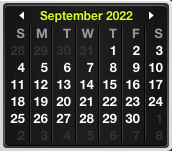
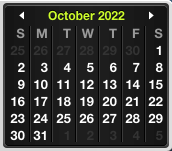
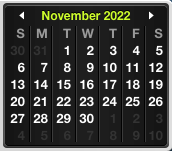 
|
|
Listings are
in the opposite order of appearance: headliner is listed at the top,
next is the support band(s),
and the last band listed is the opener.
|
 
|
 |
 |
|
| |
Tuesday November 8
2022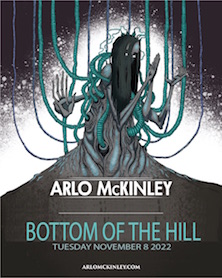 8:00PM doors -- music at 8:30PM ••• 21 AND OVER $15 in advance / $18 at the door Arlo McKinley www.arlomckinley.com/ folk soul singer-songwriter -------Good Looks off the bill Arlo McKinley will play two sets Arlo McKinley -from Cincinnati, OH -It's proof that the bad days do get better It's proof that love is still alive . . In 2019, Arlo McKinley played a show at the High Watt in Nashville. While he had years of such gigs on the DIY singer-songwriter circuit behind him, this night was different. In the audience was one of his musical heroes, John Prine. When they met briefly beforehand, Prine, who never gave praise lightly, told Arlo he was a fan. McKinley recalls, “Just that moment, if that's where it ended, it would've been one of the coolest things that ever happened to me, something I remembered forever.” But it didn't end there. Shortly after, he was signed to Oh Boy Records, Prine's indie label. Arlo came into 2020 with the momentum of a new album on deck - his first with a producer and a street team - and an international tour booked. Then things took a strange turn. “Right before the record came out, my mother passed away,” he says. “She had always supported me and she didn't get to see this stuff happen for me. Then one of my best friends died shortly after. And I lost two other friends to drug addiction. I was trying to navigate through all the emotions of that.” And of course, like all musicians that year, he couldn't tour. A soft-spoken introvert who's open about his past drink and drug addictions, McKinley had to look to himself to find comfort. And in the process, he wrote the songs for what's become his latest release, the aptly-titled This Mess We're In. “I'm kind of private with a lot of things I go through, but in my songs, I'm honest about everything,” he says with a smile. “So I started to write as a way of getting stuff out. To me, this is a growth record. I was navigating through a pretty bad time, but also there was the realization that it's time to really change, find a better way of life. My last album was me figuring out whether to stay or go from a very confused spot in my life. This one is trying to better myself - as a musician, as a human being, as a friend.” When talking about his music, McKinley often uses the word “navigate.” And indeed, the eleven songs on This Mess We're In feel like compasses to help orient himself in an uncertain world. The opener “I Don't Mind,” an ode to self-forgiveness that gathers a quiet power through each verse, sets the mood. From the plaintive reckonings of lives in limbo on “City Lights” and “Back Home” to the delicate devastation of “Stealing Dark From The Night Sky” and the catchy, Neil Young-grooved “Rushintherug,” through the gorgeous, widescreen piano-and-strings balladry of the title track and the hymn-like “Here's To The Dying,” these are songs that take their time revealing their secrets. They come from deep inside and go deep inside, speaking to you through McKinley's warm, oaky voice and leaving you a little different than how you came in. They make you feel seen, recognized. That feeling is borne out by the many personal letters that Arlo receives from fans. “When I wonder if I'm doing the right thing or not with my life, these messages make me realize that I am,” he says. A recent memorable one came from a soldier who'd done several tours in Afghanistan. “He said my last two albums were the only thing that got him through. I thought, 'I can't imagine what he saw.' If the music I was making helped him get through, that's a pretty heavy compliment.” Another came from a man who'd been diagnosed with brain cancer. “He said he'd kind of stopped living and wasn't really present with his wife and kids. He said my record made him really want to enjoy the moments that he had left with them. I invited him out to a show. He came with his family, and said, 'This is the first time I've been out in I don't know how long.' That's beyond anything I could ask for. “Maybe I get these messages because I write from my experience,” he reckons. “I figure if I'm going to put myself out there, I want to put who I am out there. I think some people relate to that, like they're not the only ones going through these darker times. But it's still crazy that something I'm writing in my bedroom can end up meaning so much to someone.” Music has always had special meaning for McKinley. Born and raised in Cincinnati, he started singing in Baptist church when he was eight. At home, the family record collection included everything from George Jones to Otis Redding. As a teen, inspired by his dad and uncle, who played guitars in church, Arlo learned some power chords and figured out every song on the first Social Distortion album. “From there, I taught myself,” he says. But a full-time music career was still years away. Through his twenties and early thirties, he worked at a record store, gigged with a duo called The Great Depression and “dabbled in songwriting.” Weirdly, it wasn't until he found himself in what seemed like a dead-end job delivering tuxedos that he decided to pursue music. “I did that for years, driving from Cincinnati to Detroit and back, but it gave me a lot of time to think and listen to music. That's when I started writing the songs that led to up to what I'm doing now.” He self-released his first album, Arlo McKinley & The Lonesome Sound, in 2014 when he was thirty-five. It may have seemed he was getting a late start. But he entered the game almost fully-formed, without any immature or embarrassing skins to shed. He says, “I wouldn't have been able to write about what I'm writing now or been very relatable if I hadn't lived the thirty-something years before I started writing.” Like his last album Die Midwestern – which Rolling Stone praised for its “songs of heartbreak, restlessness and hard-won experience” and NPR called “personal and moving” - the latest was cut at Sam Phillips Recording Service in Memphis with an ace band that includes drummer Ken Coomer, guitarist Will Sexton and keyboardist Rick Steff. McKinley says, “That studio is like a time capsule. There's just a feel where you can tell there's been some great stuff made in there - Elvis, Jerry Lee, Roy Orbison. Really though, more than the studio, it's the band and the producer.” Of Matt Ross-Spang, who's worked with Jason Isbell and Margo Price, McKinley says, “He completely gets what I'm trying to do. I sent Matt guitar-vocal demos of fifteen songs. He would show them to the band right before we'd go out to record, so a lot of these songs, the musicians are making up these parts on the spot. Jessie Munson did the string arrangements. She comes up with really pretty lines.” The addition of strings brought a cinematic dimension to McKinley's music that accentuates his feel for romantic melancholy. “I love Nick Drake and Nick Cave, how their songs can be very simple but sound big,” he says. “Wes Anderson movies too. I love how he'll use music in a very simple scene to evoke a big emotion. I think this album conveys a mental picture a lot more than stuff I've done previously. It's more than just a collection of songs. You can visualize things.” As McKinley visualizes the year ahead, he's optimistic that touring will be easier , and that he'll get to play Europe for the first time this summer. When asked what he hopes listeners will get from This Mess We're In, he says, “I hope they can identify with things they're too ashamed to talk about or feel. There's such a stigma that goes along with things like addiction and mental health. I just want them to know that I go through all of that stuff too. I would just like to make them feel a little less alone. At least for the 47 minutes of the album, you can remove yourself from the world and just let everything disappear for a bit.” Good Looks goodlooksband.com/ indie folk 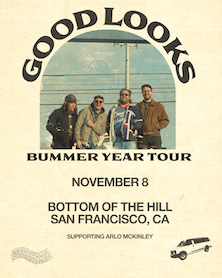 -from Austin, TX -Tyler Jordan of Good Looks grew up in a South Texas coastal town dominated by the petrochemical industry, his childhood steeped in the tension between nature and industry, exploitation abundantly present and the wealth gap in eyeshot if you just crossed the street. His father’s church, described by Tyler as “cult-like in its intensity,” was homebase and where he learned to sing. He snuck in harmonies where there was room, and where there wasn’t, and internalized melodies and structures. He bought into the content until he looked elsewhere and discovered a new obsession of studying lyrics for detail and intention. Paul Westerberg and Spoon were early influences before Tyler gravitated towards artists like Patti Smith, Parquet Courts, and Minutemen. They were all rock bands who had something to say in their lyrics, and more than that, were high expectations he could set for his own project. Tyler moved to Austin at 19 and spent his first few months busking on the loud and crowded drunken sidewalks downtown. “I used to stand on 6th and Brazos and try to bounce my voice against the brick building across the street loudly enough to have it come back and fill the street below.” It was an exercise that helped him build confidence in his voice. A short time later Tyler met and befriended his primary collaborator Jake Ames whose own relationship with music began in a Kerrville country radio station where his dad was a D.J. Barely able to reach the faders, he reached for any kind of stringed instrument he could put his hands on. They met in the late-night song-swap circles of the Kerrville Folk Festival campground (where they would also meet Buck Meek and Adrianne Lenker pre-Big Thief). Between volunteer shifts and string jams, Tyler and Jake shared their mutual love of the Texas hill country canon (Blaze Foley, Townes Van Zandt, and Willie Nelson) and discovered their parallel small Texas town musical trajectories. They shared a love of cheap diner food, thrift store baseball caps, and a healthy dose of harmless shit-talking. They began playing in bands together, backing up other songwriters and taking turns in the spotlight. Tyler was a fan of the albums coming out of Dandy Sounds, a recording studio about half an hour outside of Austin run by producer/engineer Dan Duszynski (of Loma and Cross Record). They met at Chill Phases, an idyllic showcase held at the tail end of SXSW each year on the Dripping Springs property the studio is on and talked about Julia Lucille’s Chthonic and Molly Burch’s Please Be Mine, records Dan had recorded whose layers and focused textures caught Tyler’s ear. Dan agreed to record and produce the songs that would become Bummer Year and added the touches that shaped it into a cohesive whole. “My body could be put to better use” opens “21,” a song about the structures of capitalism. The chorus falls away to a euphoric guitar run that examines one of those rare moments of actual freedom. The song looks to a future where the greed of corporations is the cause of their own downfall. It’s this message that runs through the album, as if Billy Bragg had been born in a small Texas town instead. Tyler is equally unafraid to sing about relationships and break-ups. Anthemic album opener “Almost Automatic” is a simple break-up song that amplifies those early days of a new relationship: “Pull the car over, watch the sun go down / Baby I’m just happy I could be here with you / Try not to race ahead, although my heart wants to” before wondering later “Why am I waiting on you?” The song’s inter-played guitars and build create something much bigger than the sum of its parts. They’re not afraid to record guitar solos and this is very much a rock record fronted by a songwriter honing his craft. Of “Vision Boards” Tyler says “I kept hearing people talk about manifesting things and making vision boards. It really irked me at how privileged that viewpoint is, and how it’s really just another version of ‘you’re poor because you wanna be.’ The song gets at the very real structural limitations that make it hard to succeed in the music business, while at the same time acknowledging my own personal limitations holding me back, and trying to release them.” Lines like: “To the voice inside my head / Shut the fuck up / ‘Cause I tried my best and I am not listening” are married with bright and propulsive guitar lines. Bummer Year is a record about learning to take care of yourself and tending to relationships that nourish you while wrestling the weak ones away. The songs reflect on what it is to gut your way through your twenties, learning when to apologize and when you’ve got to live with what you said, because you meant it. Unapologetically, this is a guitar record, but the room you’re sitting in is always the song. Sometimes a window slams shut and a shard of restlessness escapes. . At heart it’s a folk record with genuine Texas twang, built out with the engine of a rock band churning hot, willing to be delicate. The lyrics are nuanced and layered, political and playful. It’s a vulnerable album that earnestly and unabashedly reaches for your attention, then offers up a relationship. The title track tackles the places that made you— the folks “you’d want with you in a bar fight,” teammates you never chose but needed, the family that knows too much yet not enough to see you, the depth of camaraderie with those assigned to you by geography. It’s a love song for America, written from a place of frustration and depression, broken, with still a bit of hope tucked into its pocket. “Our strength is in our numbers, in the streets is where we show them / You force someone to listen to you when they’re fucking scared.” The empathy in the everyday is what lies at the heart of these protest songs, ultimately more Randy Newman than Bob Dylan. You might not think that a song that begins with “all my friends from high school / they all bought motorcycles / joined up with a bike gang / supported Donald Trump” could make you cry, but you’d be wrong. Good Looks is a bar band searching for common ground and yearning for a better system. |
 |